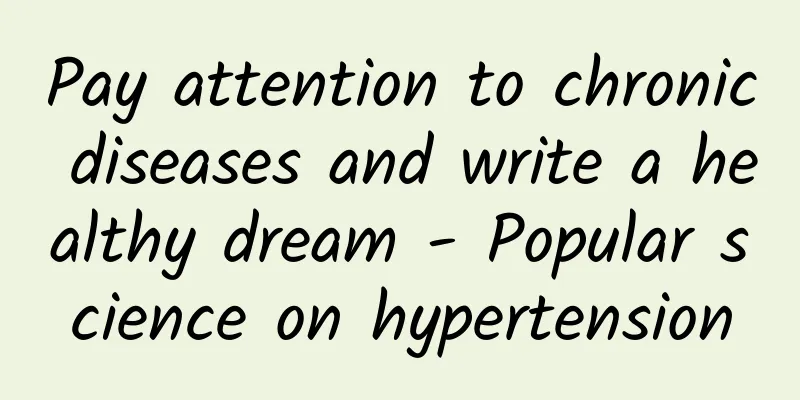Pay attention to chronic diseases and write a healthy dream - Popular science on hypertension

|
Hypertension is one of the chronic diseases that poses the greatest threat to people's health. There are a large number of people suffering from hypertension in my country, about 245 million people, which means that one in every six adults suffers from hypertension, which is a great challenge for general practitioners. 1. What is hypertension? Blood pressure is the lateral pressure exerted on the blood vessel wall when blood flows in the blood vessels. Excessive pressure is high blood pressure. 2. How to determine hypertension? 1) Without taking antihypertensive drugs, if the systolic blood pressure is ≥ 140 mmHg and/or the diastolic blood pressure is ≥ 90 mmHg for three consecutive times on different days, hypertension can be diagnosed. 2) Patients with a clear history of hypertension who are receiving antihypertensive medication are also diagnosed with hypertension even if their blood pressure is <140/90 mmHg. 3. What are the clinical symptoms of hypertension? 1) Patients may experience symptoms such as dizziness, headache, tinnitus, tight neck, nosebleed, palpitation, shortness of breath, etc. 2) Some people have no symptoms at all, some even remain asymptomatic throughout their lives, so this group of people should be paid more attention. 4. Why do people get high blood pressure? 1) Genetic factors: 60% of patients with hypertension have a family history of hypertension. If there is hypertension in the family, especially in direct relatives, you must be vigilant. 2) Bad lifestyle habits: high-salt, high-protein, low-potassium diet, overweight and obesity, smoking, excessive drinking, lack of physical activity, long-term mental stress, lack of sleep, etc. can all lead to high blood pressure. 5. What should I do if I have high blood pressure? 1) Lifestyle intervention Eight steps to healthy living Limit salt intake, lose weight, and exercise more Quit smoking, limit alcohol consumption, keep a calm mind Managing diet and sleep It is difficult not to lower blood pressure 2) Antihypertensive drug treatment You should start with a small dose and gradually lower your blood pressure. The speed of lowering blood pressure should not be too fast. It is recommended to use long-acting preparations, combined medications, and individualized treatment. Once you are diagnosed with the need to take antihypertensive drugs, you must insist on taking them. If you need to increase your medication, you must do so under the guidance of a doctor. Remember not to make decisions on your own and stop taking the medication at will. Hypertension is easy to develop but difficult to cure, so prevention is very important. It is best to measure blood pressure regularly and pay attention to changes in blood pressure. Health science popularization, thank you for your support! (Picture from the Internet) Author: Xu Lili, Department of General Medicine, First Affiliated Hospital of Shihezi University |
>>: What happens to people who often wear high heels?
Recommend
What to do if your teeth are sensitive? Finding the right cause is the key
In traditional Chinese medicine, tooth sensitivit...
What are the symptoms of female urinary tract infection
Female friends should try to avoid unclean sexual...
What should you pay attention to in late pregnancy
The late stage of pregnancy is about to start del...
Is it easy for pregnant women to have miscarriage if they eat red dates?
Pregnant women need to pay special attention to w...
Taboos for pregnant women in their eighth month of pregnancy
A pregnant mother in her eighth month is already ...
What tests can be done to diagnose cervical prolapse?
Cervical prolapse is a common gynecological disea...
[Protecting teeth and keeping healthy is a strong youth, a healthy China is a prosperous nation. Series of popular science on oral health 1] Oral health management throughout the life cycle
The results of the fourth national oral health ep...
Why do you take folic acid in the first three months of pregnancy?
With the continuous development of the economy, p...
Lonely "genius disease"
Do you have such children around you? They are of...
What is the reason for yellow vaginal discharge with odor?
For friends who have symptoms such as yellow leuc...
Is it normal for a woman to have her period 10 days late?
Women are very prone to irritability during the d...
How to relieve burping during pregnancy
Women are prone to various uncomfortable symptoms...
Pink sputum, rust-colored sputum, pus-smelling sputum...what's going on?
Author: Shi Huanzhong, Chief Physician, Beijing C...
If there is a dark area in the uterine cavity during early pregnancy ultrasound, you should be alert to one factor!
In daily life, some women may find dark areas in ...
What are the reasons why girls cannot get pregnant?
What many people dream of in their lifetime is to...









